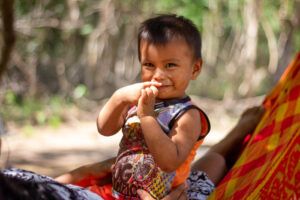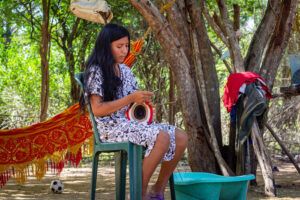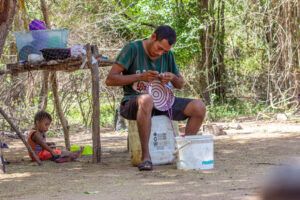 Stories
Stories
November 13, 2023 • 2 min read
Maikeli González migrated to Colombia with her family when she was only twelve years old. She is among over two million Venezuelans who have fled to neighbouring Colombia in recent years to escape violence and economic insecurity. An economic crisis in Venezuela has left many families like Maikeli's struggling to afford food, medicine, and basic services.
Making Sacrifices
“When I arrived here, I wanted to study, but they wouldn’t accept me because I didn’t have proof of my high school diploma. I told my mother, but she couldn’t afford to travel back to Venezuela to get it,” Maikeli recalled sadly. “I gave up the idea of studying and decided to start working.”
Like many of the Venezuelan refugees who came before her, Maikeli was forced to put her dreams on hold in order to pursue a life of safety and stability in Colombia. However, her journey ultimately led to her meeting her husband, Julio, a motorcycle taxi driver. Together, they work tirelessly to give their one-year-old son a better life. “For me, migration led me to my husband and to my son,” she explained.

Maikeli and Julio’s one-year-old son
New Opportunities
“I learned how to weave backpacks when I was twelve years old in Venezuela. When I first arrived in Colombia, I didn’t even have the idea of making backpacks until I saw other people making them, and I decided to follow them.”
Maikeli is a part of Artesanías para el Rescate (Artisans to the Rescue) Barrio Resiliente in Colombia, an initiative implemented by GOAL with support from the United States Agency for International Development (USAID) and Tierra de Hombres. It’s a comprehensive approach to reducing risk to vulnerable refugees and host communities through skills training and economic development initiatives, among others.

Maikeli weaving backpacks under the Artesanías para el Rescate (Artisans to the Rescue) project, implemented by GOAL
Artesanías para el Rescate offers training in weaving handbags and backpacks in the traditional style of the local Wayuu indigenous community and supports Venezuelan refugees in commercialising their weavings. “It is necessary to know where and how to sell the backpacks because the market buys them very cheaply,” she explained. GOAL facilitated workshops and training sessions that enabled Maikeli to strengthen her technique and make weaving her full-time job. “We’re happy [GOAL] came. They lend a hand and support the community here, to help us with handcrafts. I hoped they would help me to sell the backpacks as well, and they have been very supportive.”

Julio assisting with his wife’s weaving
UN agencies estimate that seven million Venezuelans have been driven from their homes in recent years. Riohacha alone has absorbed nearly 50,000 refugees. They now make up a quarter of the local population. You can help support families like Maikeli’s, who are far from home this Christmas, with a donation today.
